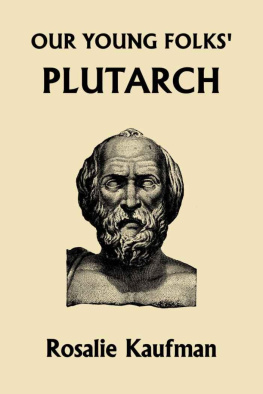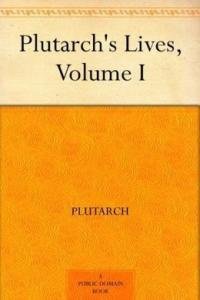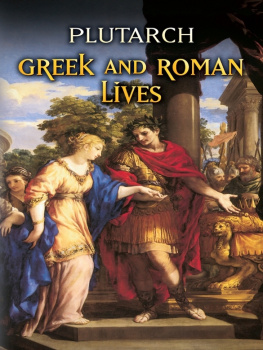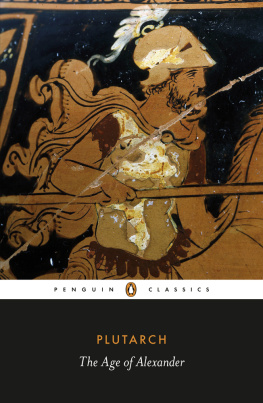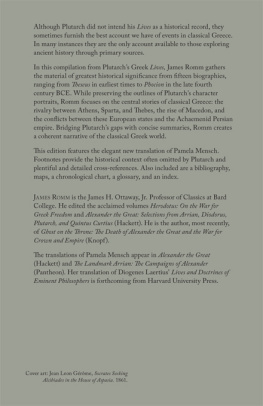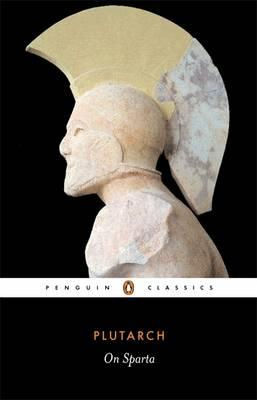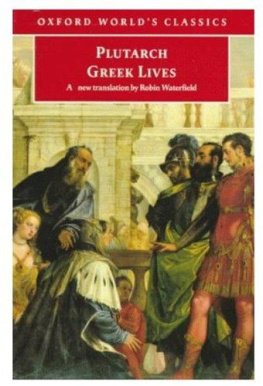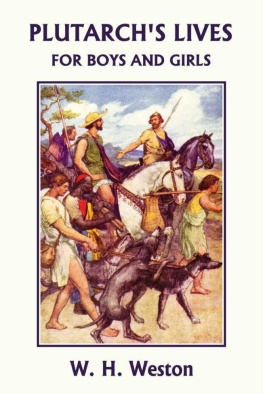Rosalie Kaufman - Our Young Folks Plutarch
Here you can read online Rosalie Kaufman - Our Young Folks Plutarch full text of the book (entire story) in english for free. Download pdf and epub, get meaning, cover and reviews about this ebook. year: 2007, publisher: Yesterdays Classics, genre: History. Description of the work, (preface) as well as reviews are available. Best literature library LitArk.com created for fans of good reading and offers a wide selection of genres:
Romance novel
Science fiction
Adventure
Detective
Science
History
Home and family
Prose
Art
Politics
Computer
Non-fiction
Religion
Business
Children
Humor
Choose a favorite category and find really read worthwhile books. Enjoy immersion in the world of imagination, feel the emotions of the characters or learn something new for yourself, make an fascinating discovery.
- Book:Our Young Folks Plutarch
- Author:
- Publisher:Yesterdays Classics
- Genre:
- Year:2007
- Rating:5 / 5
- Favourites:Add to favourites
- Your mark:
- 100
- 1
- 2
- 3
- 4
- 5
Our Young Folks Plutarch: summary, description and annotation
We offer to read an annotation, description, summary or preface (depends on what the author of the book "Our Young Folks Plutarch" wrote himself). If you haven't found the necessary information about the book — write in the comments, we will try to find it.
Our Young Folks Plutarch — read online for free the complete book (whole text) full work
Below is the text of the book, divided by pages. System saving the place of the last page read, allows you to conveniently read the book "Our Young Folks Plutarch" online for free, without having to search again every time where you left off. Put a bookmark, and you can go to the page where you finished reading at any time.
Font size:
Interval:
Bookmark:
All rights reserved. No part of this book may be reproduced or retransmitted in any form or by any means without the written permission of the publisher.
This edition, first published in 2010 by Yesterday's Classics, an imprint of Yesterday's Classics, LLC, is an unabridged republication of the work originally published by J. B. Lippincott & Co. in 1883. This title is available in a print edition (ISBN 978-1-59915-208-0).
Yesterday's Classics republishes classic books for children from the golden age of children's literature, the era from 1880 to 1920. Many of our titles are offered in high-quality paperback editions, with text cast in modern easy-to-read type for today's readers. The illustrations from the original volumes are included except in those few cases where the quality of the original images is too low to make their reproduction feasible. Unless specified otherwise, color illustrations in the original volumes are rendered in black and white in our print editions.
The lives which we here present in a condensed, simple form are prepared from those of Plutarch, of whom it will perhaps be interesting to young readers to have a short account. Plutarch was born in Chronea, a town of Botia, about the middle of the first century. He belonged to a good family, and was brought up with every encouragement to study, literary pursuits, and virtuous actions. When very young he visited Rome, as did all the intelligent Greeks of his day, and it is supposed that while there he gave public lectures in philosophy and eloquence. He was a great admirer of Plato, and, like that philosopher, believed in the immortality of the soul. This doctrine he preached to his hearers, and taught them many valuable truths about justice and morality, of which they had previously been ignorant.
After his return to his native land, Plutarch held several important public offices, and devoted his time to forming plans for the benefit of his countrymen. Living to an advanced age, he wrote many important books; but the one which gave him most celebrity is the "Lives" from which we have derived this work. He consulted all the historians of his day, but did not follow them blindly; for after carefully comparing and weighing their statements, he selected those which seemed most probable. There can be no doubt that he shared the belief of the age in which he lived, for his works give evidence of devotion to the pagan gods. The legends of the Heroic age must not be accepted as historical facts, nor must any importance be attached to the prophecies of priests, omens, oracles, and the divinations of soothsayers, except in so far as they afford a picture of ancient superstitions, and show how even the most powerful minds had their weaknesses. They may be traced to natural causes, and it seems probable that the Roman and Greek armies were victorious or the reverse, because they went into battle impressed by the favorable or unfavorable prophecies, as the case might be, of their soothsayers. Plutarch says, "It must be borne in mind that my design is not to write histories, but lives." This is why anecdotes, short sayings or a word or two of repartee are frequently recorded. For they furnish a better insight into the thoughts and character of a man than his most glorious exploit, famous siege, or blood battle. So it is lives, and not a history, that we offer; this must be borne in mind when some of the most important events the world has ever known receive insufficient mention.
| R.K. |
T HESEUS was one of the most celebrated heroes of ancient times, but he lived so many centuries ago that no one knows the date of his birth. He was a Greek of noble descent, thra, his mother, being the granddaughter of one of the most powerful of all the Peloponnesian kings. geus, his father, was not of royal blood, but he was descended from the oldest inhabitants of Attica, and became a sovereign before Theseus was born. A short time after he was chosen to rule over Athens he had occasion to travel, and one of the cities he visited was Trzene, where he was invited to court. There he met the Princess thra, with whom he fell in love. She returned his affection, and the two were married; but geus did not mention this important event when he returned to Athens, because of the displeasure that he knew it would cause his relations, and still less did he dare to do so when the birth of his son was announced to him.
This was on account of his nephews, the Pallantid, a band of fifty brothers who expected to mount the throne in turn, and would not have hesitated to destroy anybody who might stand in their way. So geus carefully preserved his secret, although it was his intention to recognize his son as soon as he felt that it would be safe to do it.
Before his departure from Trzene, geus had hidden a sword and a pair of sandals beneath a huge stone, and had told thra that when their boy should reach manhood and should become sufficiently strong to raise the stone without aid, he was to carry the articles concealed under it to Athens. In that way, after the lapse of many years, geus hoped to recognize his son. He had no fear that thra would betray the secret, for he had taken great pains to make her understand the danger to himself and Theseus if the existence of the latter should become known to the Pallantid.
Pittheus, thra's father, took charge of his grandson, and engaged a tutor named Connidas to educate him. In later years the Athenians sacrificed a ram to this tutor on the day before the celebration of the Thesean feasts, simply because he had been honored with the care of the person whom they loved, and for whom they entertained the most profound reverence.
thra was true to her trust, and told nobody who was the father of her son; but Pittheus declared that it was Neptune, the god of the sea. This pleased the Trzenians, because they considered Neptune their special deity, offered sacrifices to him, and stamped their money with a three-pronged sceptre called a trident, which was the symbol of his power.
In course of time Theseus became a robust, healthy youth, and his mother was so pleased on account of his strength of mind and body, as well as the excellent judgment he displayed on various occasions, that when he was only sixteen years of age she resolved to inform him of the secret of his birth; so taking him by the hand one day, she led him to the stone under which his father had placed the sword and sandals, bade him remove it, and with what he would find concealed beneath hasten to Athens and present himself before geus.
The youth obeyed in so far as lifting the stone was concerned, for, as we have said, he was strong, and the task was by no means a difficult one; but he astonished his mother by refusing to sail to Athens at her request. To Athens, he replied, he would certainly go, but not by sea. This announcement troubled the fond thra, for traveling by land was at that time made extremely dangerous by the bandits and cut-throats who overran Greece, and whose cruelty, strength, and desperate deeds were world-renowned. But Theseus was inspired with the spirit of the Heroic age in which he lived, and before following him in his travels we will say a few words about this period.
What is known as the Heroic age in history is supposed to have extended over about two hundred years. The Greeks believed that during that time their country was governed by a noble race of beings who, though not divine, possessed more than human strength, and were in many ways superior to ordinary men. These are the heroes, mentioned in Grecian mythology, whose exploits and noble deeds furnished themes for the early writers. The Heroic age closed with the Trojan war, 1184 B.C. Homer has given the best picture of the government, customs, and society of that age, and his poems furnish the earliest knowledge we have of the Greeks. This renders them valuable, even though they may not always be based on facts.
Font size:
Interval:
Bookmark:
Similar books «Our Young Folks Plutarch»
Look at similar books to Our Young Folks Plutarch. We have selected literature similar in name and meaning in the hope of providing readers with more options to find new, interesting, not yet read works.
Discussion, reviews of the book Our Young Folks Plutarch and just readers' own opinions. Leave your comments, write what you think about the work, its meaning or the main characters. Specify what exactly you liked and what you didn't like, and why you think so.

